- Home
- Niccolò Ammaniti
Me and You
Me and You Read online
Also by Niccolò Ammaniti
I’m Not Scared
Steal You Away
The Crossroads
First published in Great Britain in 2011 by Canongate Books Ltd,
14 High Street, Edinburgh EH1 1TE
This digital edition first published by Canongate in 2012
Copyright © Niccolò Ammaniti, 2010
The moral right of the author has been asserted
First published in Italy in 2010 as Io e te by Giulio Einaudi editore, Torino
www.canongate.tv
Every effort has been made to trace the copyright holders and obtain their permission for the use of copyright materials. The publisher apologises for any errors or omissions and would be grateful if notified of any corrections that should be incorporated in future reprints or editions of the book.
British Library Cataloguing-in-Publication Data
A catalogue record for this book is available on request from the British Library
ISBN 978 0 85786 197 9
eISBN 978 0 85786 199 3
Typeset in Van Dijck by Palimpsest Book Production Ltd, Falkirk, Stirlingshire
And this one’s for my mother and father
In a real dark night of the soul, it is always three o’clock in the morning.
F. Scott Fitzgerald, ‘The Crack-Up’
But can you save me?
Come on and save me
If you could save me
From the ranks of the freaks
Who suspect they could never love anyone.
Aimee Mann, ‘Save Me’
Contents
Introduction
Cividale del Friuli: 12 January 2010
Rome: Ten years earlier
1
2
3
4
5
6
7
8
9
10
Cividale del Friuli: 12 June 2010
Author biography
Batesian mimicry occurs when a harmless animal species takes advantage of its similarity to a toxic or poisonous species that inhabits the same territory, imitating its colouring and behaviour. In this way, the imitating species is associated in the predators’ minds with the dangerous one, increasing its chances of survival.
Cividale del Friuli
12 January 2010
‘Coffee?’
A waitress is studying me over the top of her glasses. She’s holding a silver coffee pot.
I put out my cup. ‘Thank you.’
She fills it up to the brim. ‘Are you here for the fair?’
I shake my head. ‘What fair?’
‘The horse fair.’ She looks at me. She’s waiting for me to tell her why I happen to be in Cividale del Friuli. In the end she pulls out a notebook. ‘What’s your room number?’
I show her the key. ‘One hundred and nineteen.’
She writes down the number. ‘If you’d like any more coffee you can serve yourself from the buffet.’
‘Thanks.’
‘My pleasure.’
As soon as she moves away I pull a piece of paper folded into four out of my wallet. I flatten it on the table.
My sister Olivia wrote it ten years ago, the twenty-fourth of February 2000.
I was fourteen years old and she was twenty-three.
Rome
Ten years earlier
1
On the evening of the eighteenth of February 2000 I went to bed early and dropped off straight away, but during the night I woke up and wasn’t able to get back to sleep.
At ten minutes past six, with the feather quilt pulled up underneath my chin, I was breathing with my mouth open.
The house was quiet. The only sounds I could hear were the rain tapping against the window, my mother walking backwards and forwards between the bedroom and the bathroom upstairs, and the air going in and out of my throat. Soon she would come and wake me up to take me to the meeting with the others. I turned on the cricket-shaped lamp that sat on the bedside table.
The green light painted the slice of the room where my backpack sat, swollen with clothes, beside the waterproof jacket and the bag with my ski boots and skis.
Between my thirteenth and fourteenth birthdays I’d had a growth spurt, as if they’d put fertiliser on me, and I was taller than my peers. My mother said that two carthorses had stretched me. I spent a lot of time in front of the mirror studying my white skin stained with freckles, the hairs on my legs. On the top of my head grew a hazel bush that had ears sticking out of it. The shape of my face had been remodelled by puberty, and a substantial nose separated two green eyes.
I got up and I slid my hand into the pocket of the backpack.
‘The pocket knife’s there. So is the torch. I’ve got everything,’ I whispered.
My mother’s footsteps moved down the hallway. She must be wearing the blue high heels, I thought.
I dived back into bed, turned off the light and pretended to be asleep.
‘Lorenzo, wake up. It’s late.’
I lifted my head off the pillow and rubbed my eyes.
My mother pulled up the shutters. ‘It’s a foul day . . . Let’s hope the weather’s better in Cortina.’
The gloomy light of the dawn reflected her thin silhouette. She was wearing the grey skirt and jacket that she used when she did important stuff. Her round-necked cardigan. Her pearls. And her blue high heels.
‘Good morning,’ I yawned, as if I’d just woken up.
She sat down on the edge of the bed. ‘Did you sleep well, darling?’
‘Yes.’
‘I’m going to make you breakfast . . . You go have a shower in the meantime.’
‘What about Nihal?’
She combed my hair with her fingers. ‘He’s still asleep. Did he give you your ironed T-shirts?’
I nodded.
‘Get up, come on.’
I wanted to, but a weight on my chest was suffocating me.
‘What’s the matter?’
I took her hand. ‘Do you love me?’
She smiled. ‘Of course I love you.’ She stood up, looked at her reflection in the mirror beside the door and smoothed out her skirt.
‘Get up, come on. On a day like today do I have to beg you to get out of bed?’
‘Kiss.’
She bent over me. ‘Look, you’re not joining the army, you’re going skiing for a week.’
I hugged her and slid my head under her blonde hair, which hung over her face, and I put my nose against her neck.
She had a nice smell. It made me think of Morocco. Of its narrow alleyways full of stalls with coloured powders. But I had never been to Morocco.
‘What perfume is that?’
‘It’s sandalwood soap. The usual.’
‘Can you lend it to me?’
She raised an eyebrow. ‘Why?’
‘So I can wash myself with it and carry you with me.’
She pulled the covers off me. ‘That would be a first, you washing yourself. Come on, don’t be silly, you won’t have time to think about me.’
Through the car window I studied the wall of the zoo covered in wet election posters. Higher up, inside the aviary where they kept the birds of prey, a vulture was sitting on a dry branch. It looked like an old woman dressed in mourning, asleep in the rain.
The heating inside the car made it hard to breathe and the biscuits I’d had for breakfast were stuck at the back of my throat.
The rain was easing up. A couple – he was fat, she was skinny – were doing exercises on the leaf-covered steps of the Modern Art Museum.
I looked at my mother.
‘What is it?’ she said, without taking her eyes off the road.
I puffed up my chest, trying to
imitate my father’s low voice: ‘Arianna, you should wash this car. It’s a pigsty on wheels.’
She didn’t laugh. ‘Did you say goodbye to your father?’
‘Yes.’
‘What did he say?’
‘Not to be silly and not to ski like a maniac.’ I paused. ‘And not to call you every five minutes.’
‘Is that what he said?’
‘Yes.’
She changed gear and turned down Flaminia. The city was beginning to fill up with cars.
‘Call me whenever you want. Have you got everything? Your music? Your mobile?’
‘Yes.’
The grey sky hung heavily above the roofs and between the antennas.
‘Did you pack the bag with the medicines? Did you put the thermometer in there?’
‘Yes.’
A guy on a Vespa laughed into the mobile stuck under his helmet.
‘Money?’
‘Yes.’
We crossed the bridge over the Tiber.
‘We checked the rest together yesterday evening. You’ve got everything.’
‘Yes, I’ve got everything.’
We were waiting at the stoplight. A woman in a Fiat 500 was staring in front of her. An old man was dragging two Labradors along the footpath. A seagull was crouching on the skeleton of a tree covered in plastic bags that stuck out of the mud-coloured water.
If God had come and asked me if I wanted to be that seagull, I would have answered yes.
I undid my seat belt. ‘Drop me off here.’
She looked at me as if she hadn’t understood. ‘What do you mean, here?’
‘I mean, here.’
The light turned green.
‘Pull over, please.’
But she kept on driving. Luckily there was a rubbish truck that slowed us down.
‘Mum! Pull over.’
‘Put your seatbelt back on.’
‘Please stop.’
‘But why?’
‘I want to get there on my own.’
‘I don’t understand . . .’
I raised my voice. ‘Stop, please.’
My mother pulled over, turned off the engine and pulled her hair back with her hand. ‘What’s going on? Lorenzo, please, let’s not start . . . You know I’m no good at this time of the morning.’
‘It’s just that . . .’ I squeezed my hands into a fist. ‘Everyone else is going there on their own. I can’t turn up with you. I’ll look like a loser.’
‘What are you saying?’ She rubbed her eyes. ‘I’m supposed to just leave you here?’
‘Yes.’
‘And I don’t even thank Alessia’s parents?’
I shrugged. ‘There’s no need. I’ll thank them for you.’
‘Not on your life.’ And she turned the key in the ignition.
I flung myself on her. ‘No . . . No . . . Please.’
She pushed me back. ‘Please, what?’
‘Let me go by myself. I can’t turn up with my mummy. They’ll make fun of me.’
‘That’s just silly . . . I want to make sure that everything is all right, if I have to do anything. It’s the least I can do. I’m not rude like you.’
‘I’m not rude. I’m just like all the others.’
She flicked the indicator on. ‘No. No way.’
I hadn’t counted on my mother caring this much about taking me there.
The anger was starting to build. I started banging my fists on my legs.
‘What are you doing now?’
‘Nothing.’ I squeezed the door handle until my knuckles were white. I could rip off the rear-view mirror and smash the car window.
‘Why do you have to act like a child?’
‘You’re the one who treats me like a . . . dickhead.’
She stared daggers at me. ‘Don’t swear. You know I can’t stand it. And there’s no need for you to make such a scene.’
I punched the dashboard. ‘Mum, I want to go there on my own, for Christ’s sake.’ The anger was pushing against my throat. ‘All right. I won’t go. Are you happy?’
‘Look, I am really getting cross, Lorenzo.’
I had one last card to play. ‘Everybody else said they were going there on their own. I’m the only one who always turns up with his mummy. That’s why I have these issues . . .’
‘Now don’t make me out to be the one who causes your problems.’
‘Dad said I have to be independent. That I have to have my own life. That I have to break away from you.’
My mother closed her eyes and pressed her thin lips together as if she were trying to stop herself from talking. She turned around and stared at the cars driving by.
‘This is the first time they’ve asked me along . . . what will they think of me?’ I added.
She looked around as if she was hoping someone would tell her what to do.
I squeezed her hand. ‘Mum, don’t worry . . .’
She shook her head. ‘No, I will worry.’
With my arm round the skis, the bag with the ski boots in my hand and the backpack on my shoulders I watched my mother do a U-turn. I waved and waited until the BMW had disappeared over the bridge.
I headed up Viale Mazzini. I went past the RAI building. About a metre before reaching via Col di Lana I slowed down. My heart beat faster. I had a bitter taste in my mouth like I’d been licking copper wire. All the stuff I was carrying made me clumsy. I felt like I was in a sauna inside my goose down jacket.
When I came to the intersection, I poked my head round the corner. At the end of the street, parked in front of a modern-style church, was a big Mercedes SUV. I could see Alessia Roncato, her mother, the Sumerian and Oscar Tommasi stuffing their luggage into the car boot. A Volvo with a pair of skis on the roof rack pulled up next to the SUV and Richard Dobosz got out and ran over to the others. Soon Dobosz’s father also got out.
I drew back behind the wall. I put the skis down, unzipped my jacket and took another look around the corner.
Now Alessia’s mother and Dobosz’s father were tying the skis to the roof rack. The Sumerian was hopping from side to side pretending to take a shot at Dobosz. Alessia and Oscar Tommasi were talking on their mobiles.
It took them ages to get ready. Alessia’s mother kept getting angry with her daughter for not lending a hand; the Sumerian climbed up onto the car roof to check the skis.
And eventually they left.
I felt like an idiot as I rode the tram, with my skis and ski boots, squashed in between office clerks in ties and suits, mums and kids heading off to school. If I closed my eyes it felt like I was on the cable car. With Alessia, Oscar Tommasi, Dobosz and the Sumerian. I could smell the lip balm, the suntan lotion. We would have got off the cable car, pushing each other and laughing, talking loudly regardless of the people around us, like all those people my mother and father call yobs. I would have said funny things and have made them all laugh while they put their skis on. I would have done impressions of people, cracked jokes. But I was never able to say funny things in public. You have to be very confident to make jokes in public.
‘Life is sad without a sense of humour,’ I said.
‘Amen,’ answered a lady standing next to me.
My father had said this thing about a sense of humour after my cousin Vittorio had thrown a cowpat at me during a walk in the country. I was so angry I grabbed a huge rock and threw it at a tree, while that retard rolled on the ground with laughter. Even my father and mother had laughed.
I loaded the skis on to my shoulders and got off the tram.
I looked at my watch. Seven fifty.
Too early to go back home. I was sure to run into Dad as he left for work.
I headed towards Villa Borghese, to the valley near the zoo where dogs are allowed to run off the lead. I sat down on a bench, pulled a bottle of Coke out of my backpack and took a sip.
My mobile began ringing in my pocket.
I waited a moment before answering.
‘Mum . . .’
‘Everything all right?’
‘Yes.’
‘Are you on your way?’
‘Yes.’
‘Is there much traffic?’
A Dalmatian careered past me. ‘A bit . . .’
‘Can you put Alessia’s mum on?’
I lowered my voice. ‘She can’t talk right now. She’s driving.’
‘Well, I’ll speak to her this evening then, so I can thank her.’
The Dalmatian had begun barking at its owner because it wanted her to throw it a stick.
I put my hand over the phone and ran towards the street.
‘All right.’
‘Bye.’
‘All right, Mum, bye . . . Hey, where are you? What are you doing?’
‘Nothing. I’m in bed. I wanted to sleep a little more.’
‘When are you going out?’
‘I’ll go and see your grandma later.’
‘And Dad?’
‘He’s just left.’
‘Ah . . . okay then.’
‘Bye.’
Perfect.
There he was, the Silver Monkey, sweeping up the leaves. That’s what I called Franchino, our building’s doorman. He looked exactly like a kind of monkey that lives in the Congo. He had a round head covered with a strip of silver hair. This band began at the nape of his neck and curled up over his ears and down his jawline until it joined up on his chin. A single dark eyebrow crossed his forehead. Even the way he walked was strange. He moved forward hunched over, with his long arms swaying, the palms of his hands facing forwards and his head bobbing.
He was from Soverato, in Calabria, where his family lived. But he had worked in our building since forever. I thought he was nice. My mother and my father said that he was over-familiar with them.
Now the problem was how to get into the building without him seeing me.
The Silver Monkey moved very slowly and it took him a lifetime to sweep the courtyard. Hiding behind a truck parked on the other side of the street I pulled out my mobile and dialled his home number. The phone in his basement flat began ringing. It took the Silver Monkey ages to hear it. At last he dumped the broom and loped towards the entrance. I watched him disappear down the stairs.
I grabbed the skis and boots and crossed the street. I just missed being hit by a Ka, which began honking at me. Behind it, other drivers had slammed on their brakes and were yelling insults.

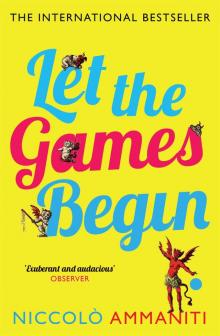 Let the Games Begin
Let the Games Begin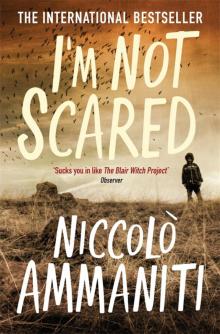 I'm Not Scared
I'm Not Scared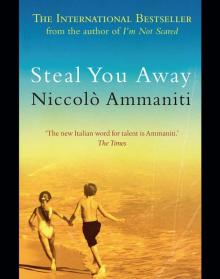 Steal You Away
Steal You Away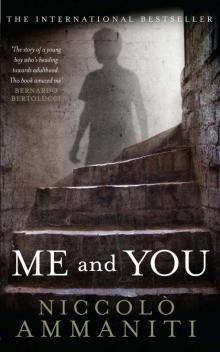 Me and You
Me and You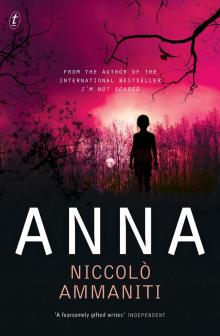 Anna
Anna